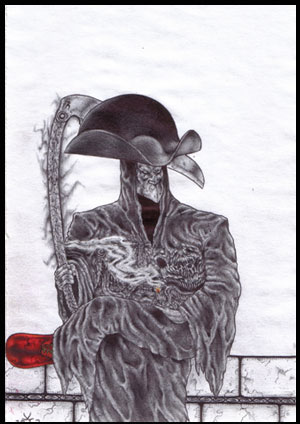(continued from A Worldwide Earthquake and a Harlot’s Fall)
In the greater scheme of things Napoleon was yet just another warrior-king in desperate need of a decent bank balance. He was the product of an age that saw the French aristocracy and the Church’s Nicolaitans finally loose their grip on both the political and economic control of Europe as well as their actual heads. However, it would be the apocryphal act of Napoleon snatching the crown out of a startled Pope’s hands and calmly place it on his own head that would signify to those in the know that the Nicolaitans were a spent force.
The worldwide earthquake that was the late 18th century age of revolution and the consequent demise of the Church had started in the unlikely setting of a New World backwater called Lexington. The following conflict between the American-born descendants of indentured servants and the mercenary lackeys of the British elite quickly escalated into the birth of a new and entirely independent nation dubbed the United States of America.
The American Revolutionary War of Independence, as it came to be forgotten by modern generations of Americans, was in reality a squabble over taxes. Naturally, at the centre of it was the growing British Empire’s inability to fund the debt it owed to a cabal of merchant bankers parked in the nation’s capital of London,… so the then British warrior-king decided the American colonists would pay it. It proved to be one of the rare hiccups suffered by Mystery Babylon during that chaotic era.
The truly revolutionary aspect to what started on the village common at Lexington has to do with the way in which the colonists decided to keep their economy going in the face of increased tax demands from Britain. Having no other asset than the product of their own labours from the land on which they lived, the colonists did the unthinkable. They started to issue their own money against that very asset, and they had the temerity to issue it debt free. It was a debt-free system of financing that was diametrically opposed to the debt-based financial model as practised by Mystery Babylon and enforced by the Bank of England – and to the horror of Britain’s banking elite it seemed to be working.
The resultant shockwaves that were felt across the Atlantic in the smugly secure offices of the London-based banking system were nothing short of a call to arms. Up to that moment the merchant bankers of Britain had been complacently confident in their ability to perpetuate the same debt-based financial slavery system in the Americas that they currently enjoyed as a monopoly in Britain and on the Continent. Sensing a serious threat to their financial monopoly, things were bound to get ugly, and get ugly fast. The American experiment had to be stopped in its tracks before it infected the rest of the world.
The French in their revolutionary experiment were, however, not so fortunate as to enjoy the same financial freedom that their American revolutionary cousins had. They too had reached the limit of their endurance suffering under a corrupt money system abused by reality-disconnected bluebloods and backed by insidious merchant bankers. In an explosion of typically flamboyant disgust the French people stormed the Bastille, cut off their warrior-king’s head and promptly found themselves at the mercy of a military dictatorship intent on can-canning its way to European conquest, financially backed by – you guessed it – merchant bankers and a national debt.
You see, after the American debacle, Mystery Babylon had got their act together and were secretly funding both sides of the proverbial French revolutionary coin in true Hegelian dialectic fashion. Napoleon got the synthesising nod in the merchant banker’s Machiavellian game of thesis versus antithesis with the last remnants of Nicolaitan influence in France being forced to flee to a new life as religious tourist attractions in the newly formed Vatican city state.
Noteworthy in the financial power broking plays that brought about this new state of affairs were the efforts of a rising star in the ranks of Mystery Babylon’s merchant banking class, a small European money changing family known in certain circles as the Red Shield.
By the late 1700s the Red Shield had also opened shop in the virtually autonomous banking capital of the British Empire, the City of London, where the local merchant banker houses were still reeling from the loss of the Americas to a debt-free money system. There the Red Shield started funding the British government’s response to the merchant banker-manipulated antics of an excessively power hungry Napoleon who was, in turn, being secretly funded by the French wing of the Red Shield,… who were, in turn, also funding other elements looking to re-establish the old French blueblood clan that had lost its head (literally and figuratively) in the revolution, the very same that had been replaced by the Red Shield-backed Napoleon.
To top it all off there was also yet more Red Shield financial support for a totally different group of bluebloods looking to usurp the original French bluebloods trying to reclaim their throne in the advent of Napolean losing his own head. No doubt about it, a growing number of Illuminated Ones started to acknowledge that these Red Shield guys played a dialectically good game and soon Mystery Babylon’s objectives were being trusted almost exclusively to the Red Shield’s sphere of operations.
The Red Shield’s moment of truth came in the wake of Napoleon’s defeat by the joint British and Prussian forces at Waterloo. Already a major source of funding for the issuance of British government bonds, the London branch of the Red Shield manipulated British business interests into believing that Napoleon had in fact won on the field of Waterloo. A selling panic ensued allowing the Red Shield to buy controlling stakes in the choicest British commercial enterprises for pennies on the pound before the true outcome at Waterloo filtered through. The Red Shield was now a made financial power in Britain and could exert huge influence over the policies of the Bank of England, the chief financial institution in the nation since 1694.
Practitioners of endogamy, that quaint practise of marrying only within ones own family or ethnic group, the Red Shield were quintessential bluebloods in all but actual title. With their growing financial influence over Europe’s waning blueblood and warrior-king clans, the Red Shield were soon anointed as fellow bluebloods and initiated into the inner sanctums of the grand Saturnian Truth. There they set about consolidating their position as a precursor to establishing outright and overall control of the dispensing and granting of illuminated wisdom. The Red Shield determined to be the first of all brethren in a New World Order born from the hidden machinations of a Mystery Babylon that was virtually now synonymous with their own objectives.
No longer bound to operating out of temples and through the religious frontages of spurious priesthoods, Mystery Babylon, through the work of the Red Shield, now felt confident enough to begin creating its own temples dedicated to the worship of money as a means of control over each and every nation on the earth. Taking as their model the existing Bank of England, these temples are what we call today Central Banks. For the Red Shield, their greatest challenge would be the establishment of such a temple in the young nation of the United States of America. The founding of the Federal Reserve Bank of America through their merchant banker proxies in that country would be their crowing achievement to date.


